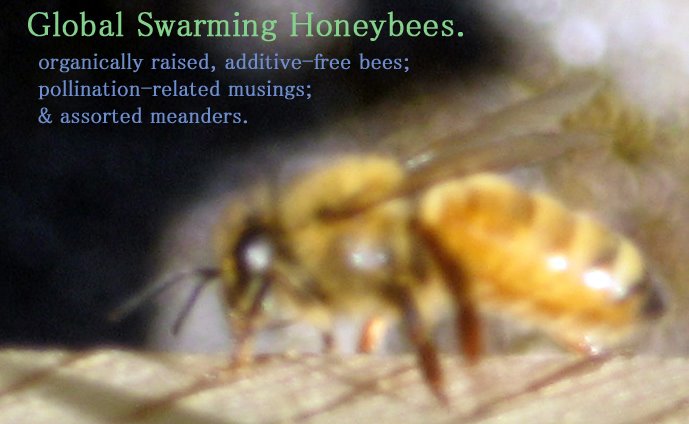British bee-defender Phil Chandler has posted an excellent piece on The Barefoot Beekeeper about the bizarre situation whereby the British Bee Keepers Association (BBKA) is endorsing certain highly questionable pesticides as "bee-friendly."
BBKA's agreement to endorse pesticides of any kind is at best an acute case of strange bedfellows...at worst...it's perverse, highly suspect, bonkers, and criminal in the Karmic sense. Something's very wrong here, and I'm glad Chandler is speaking out.
Read Chandler's Ten Reasons Why the BBKA Should Not Take Bayer's Money
And see Chandler speak on the issue here:
Is the BBKA too close to Bayer? from Gord Campbell on Vimeo.
12.12.2008
Bee-Defenders Unite!
8.18.2008
NRDC Takes EPA to Task
Mounting evidence that pesticides are implicated in Colony Collapse Disorder certainly hasn't moved the EPA to action (not that EPA is doing much of anything these days). Under Bush&Co., the EPA has transmuted from Environmental Protection Agency to Enabling Polluters...Again (or might that be Entirely Pathetic Always? I'm sure there's no end to the unflattering acronyms we can apply in this instance; feel free to post a comment suggesting your own).
EPA Buzz Kill: Is the Agency Hiding Colony Collapse Disorder Information? NRDC Forced to Sue to Get Public Records on Bee MysteryWASHINGTON, DC (August 18, 2008) – The Natural Resources Defense Council filed a lawsuit today to uncover critical information that the US government is withholding about the risks posed by pesticides to honey bees. NRDC legal experts and a leading bee researcher are convinced that the US Environmental Protection Agency (EPA) has evidence of connections between pesticides and the mysterious honey bee die-offs reported across the country. The phenomenon has come to be called “colony collapse disorder,” or CCD, and it is already proving to have disastrous consequences for American agriculture and the $15 billion worth of crops pollinated by bees every year.EPA has failed to respond to NRDC’s Freedom of Information Act request for agency records concerning the toxicity of pesticides to bees, forcing the legal action.“Recently approved pesticides have been implicated in massive bee die-offs and are the focus of increasing scientific scrutiny,” said NRDC Senior Attorney Aaron Colangelo. “EPA should be evaluating the risks to bees before approving new pesticides, but now refuses to tell the public what it knows. Pesticide restrictions might be at the heart of the solution to this growing crisis, so why hide the information they should be using to make those decisions?”
8.04.2008
A Bitter Pill from Bayer
A highly worthwhile article appeared in the L.A. Times on July 30th regarding the possible link between the "disappearing honeybees" (Colony Collapse Disorder) and Bayer pesticides. Here's a taste:
"It's likely that most people have never heard of Gaucho. And no, it's not a South American cowboy. I'm talking about a pesticide.Excerpted from Buzzzzzzzz kill by Al Meyerhoff, Los Angeles Times, July 30, 2008
"There is increasing reason to believe that Gaucho and other members of a family of highly toxic chemicals -- neonicotinoids -- may be responsible for the deaths of billions of honeybees worldwide. Some scientists believe that these pesticides, which are applied to seeds, travel systemically through the plant and leave residues that contaminate the pollen, resulting in bee death or paralysis. The French refer to the effect as 'mad bee disease' and in 1999 were the first to ban the use of these chemicals, which are currently only marketed by Bayer (the aspirin people) under the trade names Gaucho and Poncho. Germany followed suit this year, and its agricultural research institute said it concluded that the poisoning of the bees was because of the rub-off of the pesticide clothianidin (that's Pancho) from corn seeds.
So why did the U.S. Environmental Protection Agency in 2002 grant an 'emergency' exemption allowing increased use of Gaucho -- typically invoked during a major infestation -- when only a few beetles were found in blueberries? Why did the agency also grant a "conditional" registration for its close relative, Pancho, allowing the chemical on the market with only partial testing? And why is the agency, hiding behind a curtain of "trade secrets," still refusing to disclose whether the additional tests required of companies in such cases were conducted and, if so, with what results?
"Therein lies a tale. Most pesticides, we're told, are safe. So we add about 5 billion pounds a year of these deadly chemicals to our world, enough to encircle the planet if it were packaged in 100-pound sacks...."
Read the whole important thing right here.
6.23.2008
Bayer Gives Me a Headache (Happy Pollinator Week)
It's National Pollinator Week, so please do what you can, this and every week, to support our insect allies, our songbirds, and the rest of the gang.
One thing we can all do is wake up and smell the coffee (which is, as it happens, pollinated by bees, along with ants and other devalued critters).
Coffee-whiff Part 1:
Press release 5/21/08 Coalition against BAYER Dangers (Germany); "The German Office for Consumer Protection and Food Safety (BVL) has ordered the immediate suspension of the approval for eight seed treatment products due to the mass death of bees in Germany's Baden-Wuerttemberg state. The suspended products are: Antarc (ingredient: imidacloprid; produced by Bayer), Chinook(imidacloprid; Bayer), Cruiser (thiamethoxam; Syngenta), Elado (clothianidin; Bayer), Faibel (imidacloprid; Bayer), Mesurol (methiocarb; Bayer) and Poncho (clothianidin; Bayer). According to the German Research Centre for Cultivated Plants 29 out of 30 dead bees it had examined had been killed by contact with clothianidin. Also wild bees and other insects are suffering from a significant loss of population."
(And that's probably putting it mildly.)
Coffee-whiff Part 2 (as reported by the folks at Bee Culture):
Sierra Club Wants Treatments Stopped, NOW!
From Alan Harman
The Sierra Club accuses the U.S. Department of Agriculture of caving in to lobbyists over massive bee deaths and compares this with Germany taking a major step to keep their bees pollinating crops.
In light of the mounting evidence that new seed chemical coatings are deadly to bees and action by Germany calling for their immediate suspension, the Sierra Club reaffirmed its call for a U.S. moratorium on specific chemical treatments to protect our bees and crops until more study can be done.
It cites Germany's federal agricultural research institute as saying, "It can unequivocally be concluded that poisoning of the bees is due to the rub-off of the pesticide ingredient clothianidin from corn seeds."
At issue are the neonicotinoids, including clothianidin, being used in a new way - as seed coatings.
For years, farmers have been spraying neonicotinoids onto their crops to stop insect infestation. Now Bayer, Syngenta and Monsanto have acquired patents to coat their proprietary corn seeds with these neonicotinoids.
"Part of the equation in the U.S. is genetically engineered corn, as more and more corn seeds are being gene spliced with a completely different species -- a bacterium," says Walter Haefeker of the German Beekeepers Association Board of Directors. "Bayer and Monsanto recently entered into agreements to manufacture neonicotinic-coated genetically engineered corn. It's likely that this will worsen the bee die-off problem."
A Sierra Club statement says American Beekeeping Federation former president David Hackenburg has been urging the U.S. Department of Agriculture to do more study.
"Look at what's time based,” it quotes Hackenburg as saying. “The massive bee decimation started when regulatory agencies rubber stamped the use of neonicotinoid spraying and coating."
Sierra Club genetic engineering committee chairman Laurel Hopwood says the club joins the concern of beekeepers.
"It's unfortunate that regulatory agencies are using double speak,” he says. “They claim to protect our food supply - yet they aren't doing the proper studies. The loss of honeybees will leave a huge void in the kitchens of the American people and an estimated loss of $14 billion dollars to farmers. We call for a precautionary moratorium on these powerful crop treatments to protect our bees and our food."
Like I said, Happy Pollinator Week.



